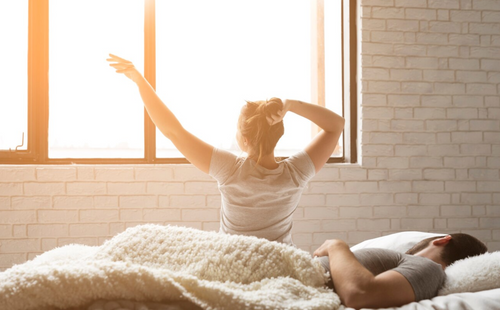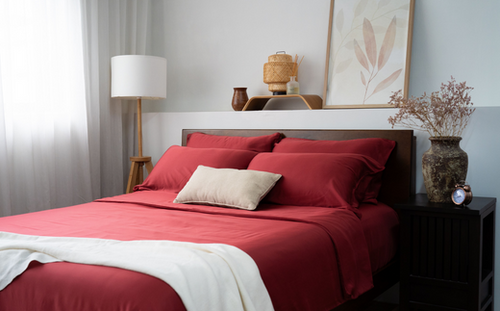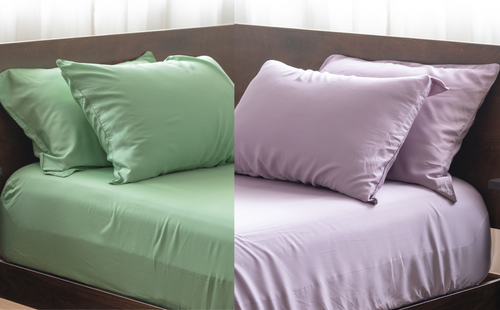At A Glance
Early birds and night owls differ by their body clocks. Knowing yours can boost focus, sleep, and daily well-being.
Quick Tips
- Align work hours with your natural energy peaks
- Use light exposure to reset your sleep pattern
- Create a calming sleep space to suit your routine
Figuring out whether you’re an early bird or a night owl goes beyond just having a favourite time to sleep. It’s all about your biological clock (or circadian rhythm) and how it impacts your energy, mood, personality, and even your brainpower.
In this article, we’ll dive into what sets early birds apart from night owls, looking at it from a science and psychology perspective. We’ll also tackle some of the most common questions about chronotypes. Let’s dive in!
Are You An Early Bird Or A Night Owl?
Night owls and early birds are the two main chronotypes. Genetics, age, lifestyle, and environment, such as exposure to light, are other determinants of when one is ready to sleep and wake up.
It's important to know one's behavioural patterns to schedule the activities of the day to optimise alertness and performance.
What Is An Early Bird?
Early birds, or morning larks, are most productive in the early morning and tend to prefer to relax in the early evening.

Image By Lookstudio From Freepik
Pros
- There was significant concentration and energy during the early morning.
- More compliance with work and school schedules.
- Improved mood and better emotional health based on statistical research.
- Social anxiety or disrupted circadian rhythms are less of an issue.
Cons
- Energy levels decrease during the afternoon and evening.
- It might be challenging to remain attentive at social parties or evening parties.
- One feels disconnected socially if others are evening or night types.
What Is A Night Owl?
A night owl feels more productive and energetic at night or in the evening and enjoys staying up late. Night owls excel in creative or flexible situations but struggle with early morning schedules.

Image From Freepik
Pros
- Peak times for creativity and concentration occur in the evening.
- Performance on tasks and solving problems is enhanced in the late evening.
- Perfect for nighttime activities or working nighttime jobs.
Cons
- Traditional early-morning responsibilities are challenging.
- A higher probability of sleep deprivation and a failure to meet social standards.
-
According to certain research, those with evening chronotypes are more likely to experience mood swings.
Understanding your biological clock allows for better routine and energy management, in addition to improving health by adjusting sleep patterns.
Early Birds Vs Night Owls: How To Tell The Difference
Determining your early bird or night owl characteristic can provide the following important information about your body and brain function.
|
Traits |
Early Birds |
Night Owls |
|
Sleep Schedule |
Prefer to sleep and wake up early, usually without the need for an alarm. |
Stay up late and have trouble waking early, particularly without help. |
|
Peak Energy Time |
Feel most alert and productive during the early to mid-morning hours. |
Reach peak concentration and mental acuity in the late evening or night. |
|
Evening Behaviour |
Wind down and become less active in the evening. |
Stay mentally alert and creative at night. |
|
Work and Study Function |
Best functioning in organised settings with early routines. |
Perform well in tasks involving creativity, problem-solving, and lateral thinking during the night. |
|
Social Habits |
May shun late-night social gatherings and insist on quiet, early routines. |
More likely to socialise or work in the evening. |
|
Health Consequence |
Often experience more stable sleep and better mood alignment with the daily routine. |
May struggle with sleep deprivation if forced into early schedules. |
|
Adjustment Difficulty |
Struggle to stay up late without feeling drained. |
Feel groggy or disoriented in the morning, especially before 9 AM. |
Night Owls Vs Early Birds: Scientific And Psychological Differences
Let’s take a look at a few different areas to get a broader perspective on the whole early bird versus night owl debate.
1. Sleep-Wake Cycle
Early Birds: They possess a naturally earlier circadian rhythm, which makes individuals sleep early during the evening and induces waking up early in the morning.
Night Owls: They possess a late circadian rhythm. They tend to sleep later at night and might have difficulty waking up early in the morning.

Image By Yanalya From Freepik
Their circadian rhythms are influenced by factors such as light, hormone levels, and core body temperature. Light, particularly blue light, plays a key role in resetting the body’s internal clock, while hormones like melatonin and cortisol regulate feelings of sleepiness and alertness. This is why morning light encourages an earlier wake-up, while evening light can push back both sleep and wake times.
2. Cognitive Performance
Early Birds: They perform well during the first half of the day. Additionally, studies show that early birds work best in organised settings where there is a need for concentration and routine within regular working hours.
Night Owls: They work well in the late evening and late afternoon. Based on some cognitive tests, night owls work best on creative problem-solving activities, particularly those requiring logical thinking.
Early birds might find their niche in 9-to-5 roles, but night owls prefer workplaces with adaptable working hours or flexible creativity.
3. Distribution And Concentration Of Energy
Early Birds: They have sustained levels of energy early in the morning and are tired in the evenings.
Night Owls: They tend to feel low levels of energy during mornings, yet remain more focused with enhanced mental sharpness through the day.

Image By Pressfoto From Freepik
This is important in coordinating one's vocation or lifestyle with their natural rhythm. A night owl might not do well with early morning meetings or classes, whereas an early bird might not do well in late-night social environments.
4. Personality Traits
Early Bird Personality: Research indicates that early risers tend to be described by such personality traits as conscientiousness, punctuality, and optimism. They tend to be perceived as more proactive and structured.
Night Owl Personality: Night owls are usually characterised by openness, creativity, and contemplation. These groups, as some researchers suggest, are more adaptable and open to new concepts.
One study in the Personality and Individual Differences journal found that night owls could have increased levels of risk-taking behaviour, although they show increased emotional variation.
5. Mood And Mental Health
Early Birds: Those who have a good sleep routine experience less depression and anxiety. This resulted in better social integration and psychological hardness.
Night Owls: Night owls are likely to develop mood disorders if their natural rhythm is disrupted by alterations in their sleep and work routine. But these risks are minimised when night owls can follow their normal sleep and work routine.

Image By Rawpixel.com From Freepik
Can You Change Your Sleep Pattern?
Absolutely, you can shift your sleep pattern. It’s all about adjusting your sleep-wake cycle, which is controlled by your body’s internal clock (circadian rhythm). With the consistent effort to change your sleep habits, you can establish a more routine.

Image By Diana.grytsku From Freepik
What Causes Sleep Patterns?
Your circadian rhythm is the major driver of your sleeping patterns. Your internal 24-hour clock governs your sleep-wake cycle. The following influences this rhythm:
- Genetics: It plays a key role in sleep timing, influencing whether you're an early riser or a night owl. Your body's internal clock is shaped by inherited traits, affecting when you feel most alert or sleepy.
- Age: Young individuals like to stay up late, while older individuals often prefer earlier times.
- Light exposure: Light exposure, especially to direct sunlight and artificial blue light.
-
Lifestyle factors: Work schedules, caffeine consumption, and screen use are all strong factors that impact our mental health.
How To Sleep Better As An Early Bird Or Night Owl
Whether you're an early riser or a night owl, creating the perfect sleep environment is key to improving your rest. Your natural sleep patterns might differ, but both early birds and late sleepers can benefit from a well-designed sleep space.
-
Comfortable Bedding: Invest in soft, breathable bedding to maximise comfort and promote restful sleep. Weavve's cooling sheets are designed to regulate your body temperature, ensuring a more comfortable and uninterrupted night, particularly during warmer nights.
Featuring Weavve’s Signature TENCEL™ Deluxe Set
-
Room Temperature: Keep your room cool to encourage deep sleep. This helps your body maintain the ideal temperature for optimal rest.
-
Minimise Light: Blackout curtains are a must for night owls, blocking out unwanted light, while early risers can benefit from keeping their room dark to prevent waking too early.
-
Relaxing Atmosphere: Transform your room into a serene haven with calming scents. Soy candles and reed diffusers help set a soothing mood, promoting better sleep.
Featuring Weavve’s Soy Candle
Frequently Asked Questions
Are Night Owls More Intelligent Than Early Birds?
Studies show that night owls tend to be more creative and have higher IQs than early risers, according to The Independent. However, they score slightly lower academically due to differences in brain chemistry, which affect their performance in structured daytime environments.
Are People Who Wake Up Earlier Happier?
Yes, waking up earlier can lead to greater happiness and well-being. Early risers are often less likely to develop depression, anxiety, and other mood disorders. This may be because they get more exposure to natural daylight, which lifts their mood, and generally experience better sleep quality.
Can A Night Owl Become An Early Bird?
Yes, a morning person can transform into a night owl, but it takes time and consistency. Just as with transitioning from being a night owl to an early bird, changing your habits and lifestyle can impact your sleep patterns. While genetics does influence sleep preferences, with commitment, you can shift your internal clock either way.
Are Night Owls And Early Birds Compatible?
Night owls and early birds can certainly make it work, though it might take a little adjusting. While differing sleep schedules can pose challenges, with patience and open communication, couples can find their rhythm.
For instance, early risers may relish the calm of mornings, while night owls can enjoy the peace of late-night chats. The key to harmony lies in finding common ground and respecting each other’s routines.
Key Takeaway
The difference between early birds and night owls is more than a lifestyle—it’s deeply connected to genetics, biology, and psychology. While early birds may benefit from morning energy and societal alignment, night owls often thrive in creative tasks and flexible schedules.
Recognising and respecting your chronotype can enhance not just sleep, but your mental clarity, productivity, and overall well-being.










































